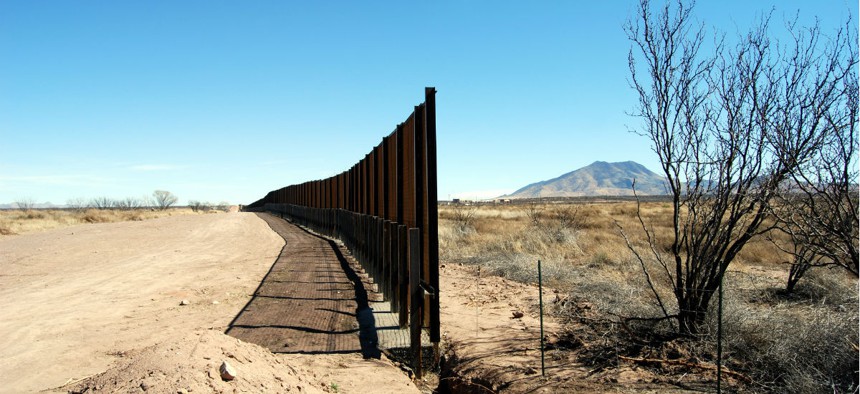Trump Administration’s Transparency Questioned as It Awards First Border Wall Contracts
DHS selects four companies to build concrete wall prototypes.
The Trump administration has taken another step forward in building a wall between the United States and Mexico. Despite not yet receiving authorization for the president’s signature campaign promise, the Homeland Security Department has selected four companies to build prototypes.
The potential awardees will build the sample barriers with reinforced concrete and will range from 18 to 30 feet tall, DHS' Customs and Border Protection announced Thursday. The companies will construct their prototypes along the U.S.-Mexico border in San Diego. CBP selected Caddell Construction Co., (DE), LLC, from Montgomery, Alabama; Fisher Sand & Gravel Co., DBA Fisher Industries, from Tempe, Arizona; Texas Sterling Construction Co., from Houston; and W. G. Yates & Sons Construction Company, from Philadelphia, Mississippi.
The selection satisfies the first of two requests for proposals issued by CBP. The agency also asked for wall designs using “other materials.” It will make a decision on vendors for that request next week.
CBP initially issued its requests in March, following a January executive order in which Trump calling for a “physical wall.” The original timetable for prototype construction was delayed when the Government Accountability Office decided to review protests from a company CBP did not select. GAO ultimately dismissed that protest last week when the company failed to meet a deadline to file comments.
The government will award the four companies between $400,000 and $500,000 to construct their prototypes, CBP acting Deputy Commissioner Ronald Vitiello said. Earlier this year, Congress authorized the Homeland Security Department to reprogram $20 million for the prototype phase of the wall contract. CBP said it expects the companies to construct their wall samples this fall.
The agency has not made the contracts public, which the Project on Government Oversight said it found troubling. POGO previously submitted a public records request for the proposals companies submitted, but the request was denied on the grounds the bids were proprietary.
While the administration is pushing forward, it still faces a fight from Congress to receive the money it needs to build the wall. In his campaign, Trump said it would cost up to $12 billion—and that Mexico would pay for it—while congressional Republicans have estimated the bill at $15 billion. The White House requested $1.6 billion for the wall in fiscal 2018, which the House has already approved in a partial spending package. In the Senate, where any spending bill will require 60 votes, Democrats have vowed to oppose any funding for wall construction. Sen. Patrick Leahy, the top Democrat on the Senate Appropriations Committee, recently called the wall “foolish, costly and useless.” For his part, Trump has promised to shut down the government if he is sent an appropriations measure that does not include wall funding.
In the meantime, CBP said the prototypes will inform the agency on its best strategy going forward.
“The prototypes will inform future design standards which will likely continue to evolve to meet the U.S. Border Patrol’s requirements,” CBP said. “Through the prototyping process, CBP may identify new designs or influences for new designs that will expand the current border barrier toolkit that CBP could use to construct a border wall system.”
Laura Peterson, an investigator with POGO, said the prototyping model was not unusual, noting it aligns with a DHS trend of soliciting many ideas from individuals and industry in order to select the best option. She expressed concern, however, about the administration’s lack of transparency and the speed with which it has moved through the process.
CBP should be “spending time, not rushing it through because of a political imperative,” Peterson said. “Regardless of your opinion of the necessity of a border wall, bad contracting practices will lead to a bad project.”




